 Petzlover
Petzlover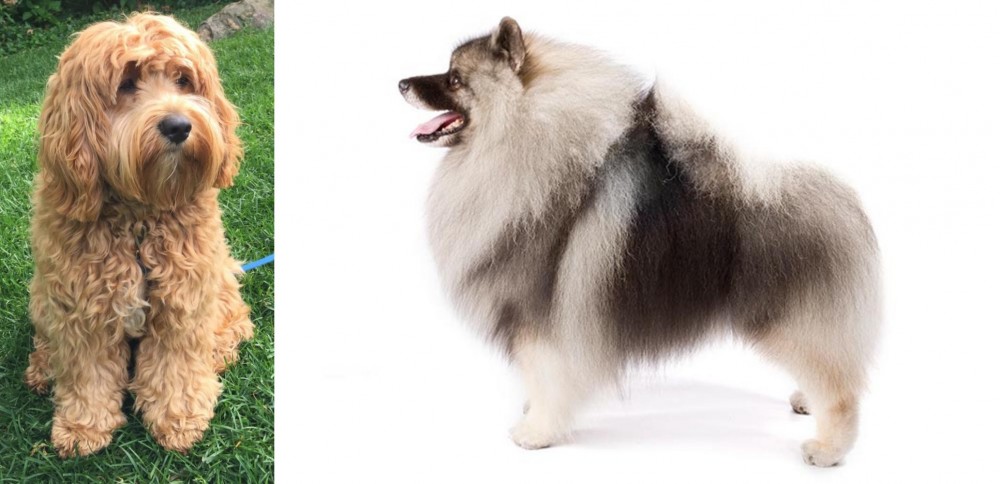 Cockapoo is originated from United States but Keeshond is originated from Netherlands. Cockapoo may grow 10 cm / 3 inches shorter than Keeshond. Cockapoo may weigh 7 kg / 15 pounds lesser than Keeshond. Both Cockapoo and Keeshond has almost same life span. Both Cockapoo and Keeshond has almost same litter size. Both Cockapoo and Keeshond requires Moderate Maintenance.
Cockapoo is originated from United States but Keeshond is originated from Netherlands. Cockapoo may grow 10 cm / 3 inches shorter than Keeshond. Cockapoo may weigh 7 kg / 15 pounds lesser than Keeshond. Both Cockapoo and Keeshond has almost same life span. Both Cockapoo and Keeshond has almost same litter size. Both Cockapoo and Keeshond requires Moderate Maintenance.
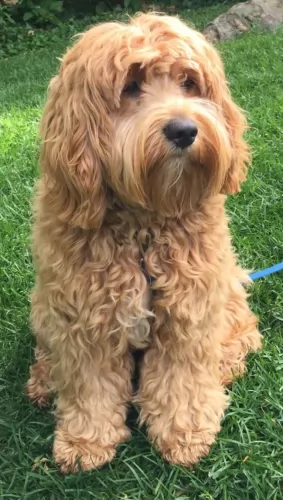 The gorgeous Cockapoo is a mixed-breed dog. He comes from mixing the Cocker Spaniel with a Poodle.Both these dogs have their own histories.
The gorgeous Cockapoo is a mixed-breed dog. He comes from mixing the Cocker Spaniel with a Poodle.Both these dogs have their own histories.
Known as a ‘designer dog’, the Cockapoo has been around since the 1950s in the United States already, although pure-breed associations don’t recognize the Cockapoo. There are some dog clubs that are working to establish the Cockapoo as a recognized breed.The Cockapoo Club of America was founded in 1998.
 Keeshond is the term used for German Spitzes and although many American references have it that the Keeshond originated in the Netherlands, some say the dog originated in Germany and is a member of the German Spitz family.
Keeshond is the term used for German Spitzes and although many American references have it that the Keeshond originated in the Netherlands, some say the dog originated in Germany and is a member of the German Spitz family.
The Club for German Spitzes was founded in 1899. The Nederlandse Keeshond Club was formed in 1924. The Keeshond is also referred to as ‘The Smiling Dutchman’.
It was in the 17th and 18th centuries that the Keeshond was used greatly as a watchdog, appearing in England in the late 1800s, but after the turn of the 20th century, Mrs. Wingfield Digby of Dorset, England and Mrs. Alice Gatacre, a Dutch breed authority, living in England, stirred interest in the breed with their kennels.
An English breed Club was formed in 1926, and the first Keeshond was registered with The American Kennel Club in 1930.
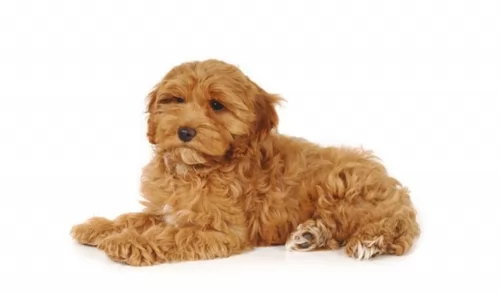 The Cockapoo is a mixed breed- or hybrid dog that has become very popular in recent years. He is a small dog, but robust, and stands between 25 – 38cm in height and weighs between 5 and 11kg.
The Cockapoo is a mixed breed- or hybrid dog that has become very popular in recent years. He is a small dog, but robust, and stands between 25 – 38cm in height and weighs between 5 and 11kg.
The Cockapoo has floppy ears, and the tail has always been docked to give the dog an attractive, distinctive look. Without tail docking, the natural tail is long.
The coat color of cockapoos is varied and can be anything like tan, white, cream, blonde, brown or black and sometimes even a combination of these colors. Cockapoo coats can vary from silky smooth to tight curls, although they usually fall somewhere in between.
He is a low shedder and you’ll often hear him being described as hypoallergenic, which is an advantage for Cockapoo owners who might be allergic to pet hair.
He is small and robust, always ready for a game and is loving, with a sweet, alert expression on his face. Even as an adult, his antics and looks make one think that he is just a big puppy.
He makes a wonderful pet and gets on well with adults and children as well as other pets. He is intelligent and can be easily trained, and when you shower him with attention he is a happy, energetic, social, fun-loving dog who goes out of his way to please you and be the perfect pet.
The personality of the Cockapoo isn’t set in stone and while one dog may be territorial and somewhat aggressive, others aren’t. Many dogs simply turn out according to the way they are raised.
 The Keeshond is a medium-sized dog and a member of the Spitz group of dogs. He stands at 43 – 48cm in height and weighs 14 – 18kg.
The Keeshond is a medium-sized dog and a member of the Spitz group of dogs. He stands at 43 – 48cm in height and weighs 14 – 18kg.
He has a 2-layered, dense coat which is fairly long, straight and coarse and colors are grey, silver, black and cream. His undercoat is a very light cream color. He has erect ears, a fairly shop muzzle and a feathery, plumed tail which curves over his back.
The hair on his legs is fairly short accompanied with some feathering. A typical marking-feature of the Keeshond is the dark line which runs from the outer corner of each eye to the lower corner of each ear. It's what gives the dog his well known keeshond expression. The eyes of the dog are dark brown.
The Keeshond, just like other Spitz dogs, are playful, affectionate, friendly and eager to please. He is intelligent too and will respond well to training and socialization.
He makes a wonderful family pet as he is friendly and playful with children, loving all their games. He gets on well with other pets too. He is a social dog, thriving on being with his human family, wanting to participate in all family activities.
They are sensitive, loving pets and become very attached to their owners. They have even been used as comfort dogs in rescue situations, as they bond so well with people.
He makes a good watchdog too with his loud bark which he uses to deter intruders. He may well be a good watch- and guard dog but he isn't an aggressive dog.
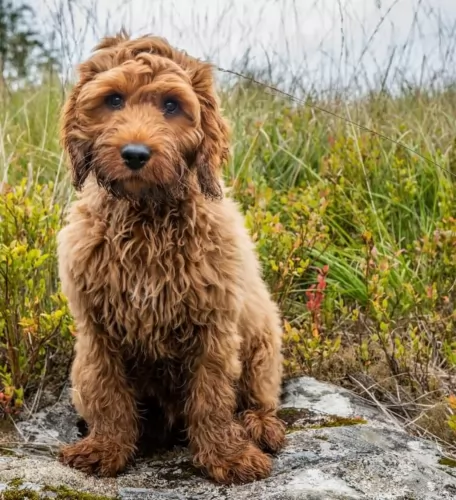 Cockapoos have become popular pets because they have a host of good qualities from both the breeds that make this pet – the cocker spaniel and the poodle.
Cockapoos have become popular pets because they have a host of good qualities from both the breeds that make this pet – the cocker spaniel and the poodle.
They are jaunty, sweet looking, amicable, social, fun-loving, devoted, loyal, loving and low-shedding as an added perk. He loves spending time with his human family and will become unhappy and bored if he isn’t made to feel absolutely part of the family.
Look after your Cockapoo, because when you provide him with good food, you take time to exercise him and you love him to bits, you’ll find that you’ve got in him all the makings of a wonderful friend.
 The Keeshond, with his thick double coat, loves to be outdoors in cool weather. He won't be there too long however, because he will be missing his human family. He is such a social dog, craving human company and therefore isn't a dog to be put out in the backyard and left day after day.
The Keeshond, with his thick double coat, loves to be outdoors in cool weather. He won't be there too long however, because he will be missing his human family. He is such a social dog, craving human company and therefore isn't a dog to be put out in the backyard and left day after day.
He loves games and being totally involved with his human family. Look after your Keeshond well – he is a companion dog - and you will find him to be a most exceptional friend of yours.
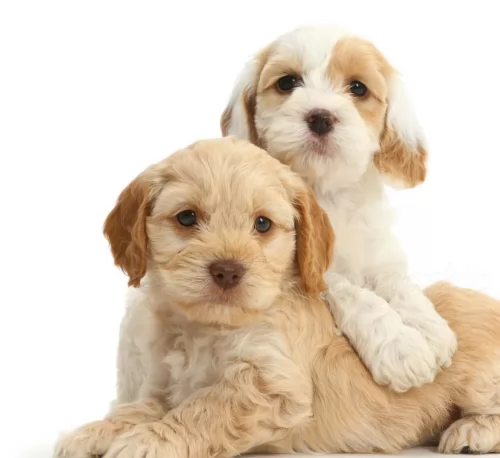 The Cockapoo is generally a healthy, good tempered, mix-breed dog and with good care he can live to be anything from 13 – 15 years of age and even older.
The Cockapoo is generally a healthy, good tempered, mix-breed dog and with good care he can live to be anything from 13 – 15 years of age and even older.
Although you’re not likely to find any serious health problems with the Cockapoo, it is wise to know that there are many common dog illnesses that attack any dog, including the Cockapoo. Some of these are hip dysplasia, ear infections, dental disease which can affect other parts of the body as well as eye disorders.
Referring to ear infections, as a long-eared dog, the ears will need to be cleaned with the Cockapoo to avoid ear infections. Simple cleaning methods are explained at the veterinarian. Some eye conditions like progressive retina atrophy are common in both the dogs that make the Cockapoo.
 With good food, fresh water, exercise and lots of interaction with your Keeshond, he can reach 12 to 14 years of age.
With good food, fresh water, exercise and lots of interaction with your Keeshond, he can reach 12 to 14 years of age.
No matter how healthy your dog is, he can still get ill, but the chances are less likely when he is feed nutritionally. Nonetheless look out for hip dysplasia, bloat, ear infections, skin rashes and eye diseases.
This is a problem in the lens of the eye. Your dog has a cloudy look to the eye. A cataract can occur when the cells are damaged. A disease such as diabetes can also cause a cataract and high blood sugar levels can change the metabolism of the cells in the lens.
The lens should be crystal clear, but with a cataract, the vision of the dog is obscured. It can cause blindness. Thankfully, cataracts aren't painful and most times dogs with cataracts can still see. There is the option of surgery to remove them too.
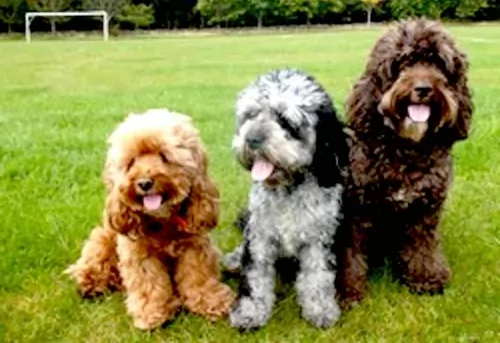 The Cockapoo can have a long, straightish coat or it can be wavy or curly. The coat will need a good brushing at least twice a week to avoid matting. He may well need a trip to the doggy parlor to have his hair professionally clipped.
The Cockapoo can have a long, straightish coat or it can be wavy or curly. The coat will need a good brushing at least twice a week to avoid matting. He may well need a trip to the doggy parlor to have his hair professionally clipped.
What is also noticeable about this dog is that he is odorless too. Bathing him doesn’t have to be a regular occurrence at all, as too much bathing strips the coat of its natural oils, irritating and drying out the skin.
The Cockapoo is an energetic little dog and he will require exercise from you. Make it fun for him seeing that he is a fun loving dog, and take him on walks and have ball games with him.
There are many different commercially produced dog foods, and some of the top quality ones offer an excellent mix of meat, fish or poultry in them with vitamins and minerals.
These top quality foods are usually found at your vet or in special pet stores and are not ordinarily found at the supermarket. Make sure to feed your Cockapoo the right amount of food according to the label on the packaging.
You can also include cooked brown rice, vegetables and chicken into his kibble to give him some variety and give him some raw meat in his diet from time to time. This will help with avoiding skin allergies. Make sure he always has access to clean, cool water.
 With his double coat, your Keeshond will need regular brushing to get rid of all those loose hairs. He is a dog which doesn't have that typical dog odor about him so bathing him is discouraged. Too much bathing irritates a dog's skin and dries it out.
With his double coat, your Keeshond will need regular brushing to get rid of all those loose hairs. He is a dog which doesn't have that typical dog odor about him so bathing him is discouraged. Too much bathing irritates a dog's skin and dries it out.
Check the inside of his mouth and make sure that his teeth are in a healthy state. If you are unsure, speak to your vet about dental hygiene as bad teeth won't only cause pain and discomfort for your pet, the teeth can affect his immune system and other body parts.
Check his claws too and have them cut when they become too long. When they are long they can hook on things and injure the sensitive area of the paws.
The Keeshond is a sturdy dog, loving all the activities and games that his family are involved in. He will love to be your walking companion and looks forward to his walk every day.
He is such a playful, adventurous dog and is always willing to join you in new games. Never put him in your back garden and forget about him, as this will make him ill and depressed. He must be part of the family to be healthy and happy and relies on you to include him in all your activities. He can live in the city or the countryside but will require being exercised wherever he is.
Top quality dry kibble will work for your Keeshond. If you want to keep him bright eyed and bushy tailed, mix in some quality home-made food too such as cooked chicken, rice and vegetables. You can also try to sometimes include a little bit of raw meat as well.
He is an active dog and will need a diet high in protein. Also, his thick coat needs to be maintained, and apart from regular brushing, look for quality dog foods that have Omega-3 fatty acids in them so as to maintain the skin and coat of the dog. Make sure he always has access to fresh, cool water.